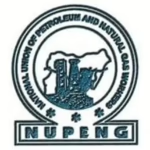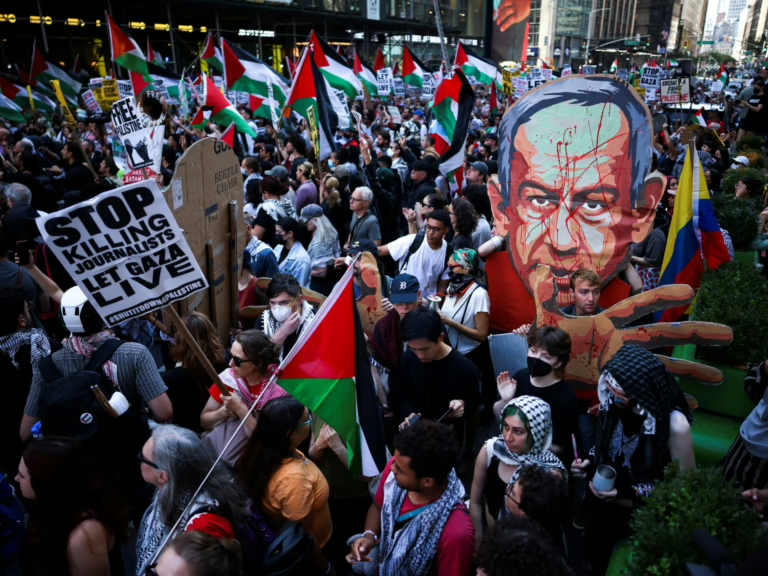New York City – As Israeli Prime Minister Benjamin Netanyahu addressed the United Nations General Assembly (UNGA), thousands of New Yorkers, alongside global diplomats, expressed their disapproval by turning their backs on him.
On Friday morning, demonstrators gathered in New York City streets to protest Netanyahu’s presence, while numerous delegates exited the UN Assembly hall as he commenced his speech on the fourth day of the General Debate.
Meanwhile, just a few blocks away, diplomats from various nations convened as part of the Hague Group, deliberating on concrete steps, including sanctions, to respond to Israel’s nearly two-year-long offensive in Gaza.
Al-Sharif Nassef, a participant in the New York protest, condemned Netanyahu’s presence in the city, stating it was disgraceful that he was not in The Hague facing charges at the International Criminal Court (ICC), which issued an arrest warrant for him last year.
“The New Yorkers gathered here today stand united in demanding his arrest. He is unwelcome in this city,” Nassef told Al Jazeera.
“God willing, with the incoming mayor, he will be detained the moment he steps foot in New York.”
Earlier this month, Zohran Mamadani, the Democratic candidate for New York mayor, pledged to uphold the ICC’s arrest warrant against Netanyahu. However, since the United States is not a signatory to the tribunal, it remains uncertain whether the New York Police Department has the jurisdiction to detain the Israeli leader.
“Is baby formula Hamas?”
Following Netanyahu’s address, protesters marched from Times Square to a park near the UN headquarters along the East River.
Waving Palestinian flags, they chanted slogans such as “Free Palestine” and “Arms embargo now,” weaving through the city streets under a significant police presence.
Some marchers also carried the flags of Colombia and Ireland, nations known for their vocal support of Palestinian rights.
Nasreen Issa, a member of the Palestine Youth Movement – NYC and one of the march’s organizers, emphasized that the large turnout sends a clear message: the United States should not be welcoming Netanyahu with open arms.
“Even if change isn’t immediate, protests are crucial in building the political momentum necessary for real transformation,” Issa told Al Jazeera.
Holding a cardboard sign that read, “Is baby formula Hamas???” Meagan Fredette highlighted the severe Israeli restrictions on essential food supplies in Gaza, which have led to a humanitarian crisis described by UN monitors as a deadly famine.
Fredette expressed her outrage at Netanyahu’s presence in her city. “It’s infuriating and humiliating that he’s here. He’s a wanted criminal, and New Yorkers are deeply unhappy about his visit,” she said.
At the UN’s security perimeter, the protesters encountered a small group of counter-demonstrators waving Israeli flags. Police officers kept the two groups separated, confining the pro-Israel supporters behind barricades.
When one man brandishing an Israeli flag began shouting insults at the anti-Netanyahu crowd, law enforcement swiftly intervened and moved him away from the demonstration.
Netanyahu’s Speech Broadcasted on Palestinian Phones
Inside the UN General Assembly, Netanyahu spoke to a partially emptied hall, with applause coming predominantly from a single section on the upper tier.
When asked if those applauding were guests of the Israeli delegation, UN Secretary-General Antonio Guterres’s spokesperson, Stephane Dujarric, responded, “Every delegation is permitted to bring guests.”
In a controversial move, Netanyahu’s office announced on X that the Israeli military had taken control of phones belonging to Gaza residents and Hamas members to broadcast his speech live on their devices.
“In an unprecedented step, Prime Minister Benjamin Netanyahu has ordered the Israeli military to seize control of Gaza residents’ phones, streaming his address directly to them,” the statement read.
Additionally, his office shared that the speech was broadcast via loudspeakers to the beleaguered and starving population in Gaza.
When Al Jazeera requested a comment from Dujarric regarding the use of a UN event to taunt an entire population, he declined to provide a direct response.
“I have no specific remarks on that,” he said. “Our priority should be alleviating Palestinian suffering, increasing humanitarian aid, and securing the release of hostages.”
Israel’s military campaign has resulted in over 65,500 deaths in Gaza, including roughly 20,000 children, leaving much of the territory devastated.
This year’s UNGA session unfolds amid mounting global condemnation of Israel’s actions. Several Western nations, traditionally allied with Israel, formally recognized the state of Palestine during the assembly.
![Palestine solidarity protesters gather in NYC as Netanyahu speaks [Ali Harb/Al Jazeera]](https://lifeinlagos.com/wp-content/uploads/2025/09/1758920883_29_Protests-calls-for-sanctions-greet-Netanyahu-at-UN-amid-Gaza.jpeg)
Diplomatic Efforts at the Hague Group Meeting
On Friday, representatives from 24 nations participating in the Hague Group, which seeks to end the Gaza conflict, called for decisive action beyond mere rhetoric.
Palestinian UN Ambassador Riyad Mansour urged the international community to impose sanctions on Israel.
“Time is running out. If we fail to act, more children will perish,” Mansour warned during the meeting.
“Palestinian children are being killed, starved, orphaned, and traumatized. Families are torn apart, lives shattered, lands seized, and territories annexed.”
Mansour also appealed for global backing of South Africa’s genocide lawsuit against Israel at the International Court of Justice.
The gathering included delegates from Colombia, South Africa, Qatar, Turkey, Mexico, Saudi Arabia, Brazil, Ireland, Spain, and Uruguay.
Israel’s Foreign Minister Mauro Vieira cautioned against ignoring the ongoing atrocities.
“International law obliges states not only to refrain from genocide but also to prevent it. Failure to do so may result in state responsibility, including complicity,” Vieira stated.
“It is imperative that states fulfill their duties under the Genocide Convention by implementing effective measures to ensure they do not, directly or indirectly, support perpetrators.”

















